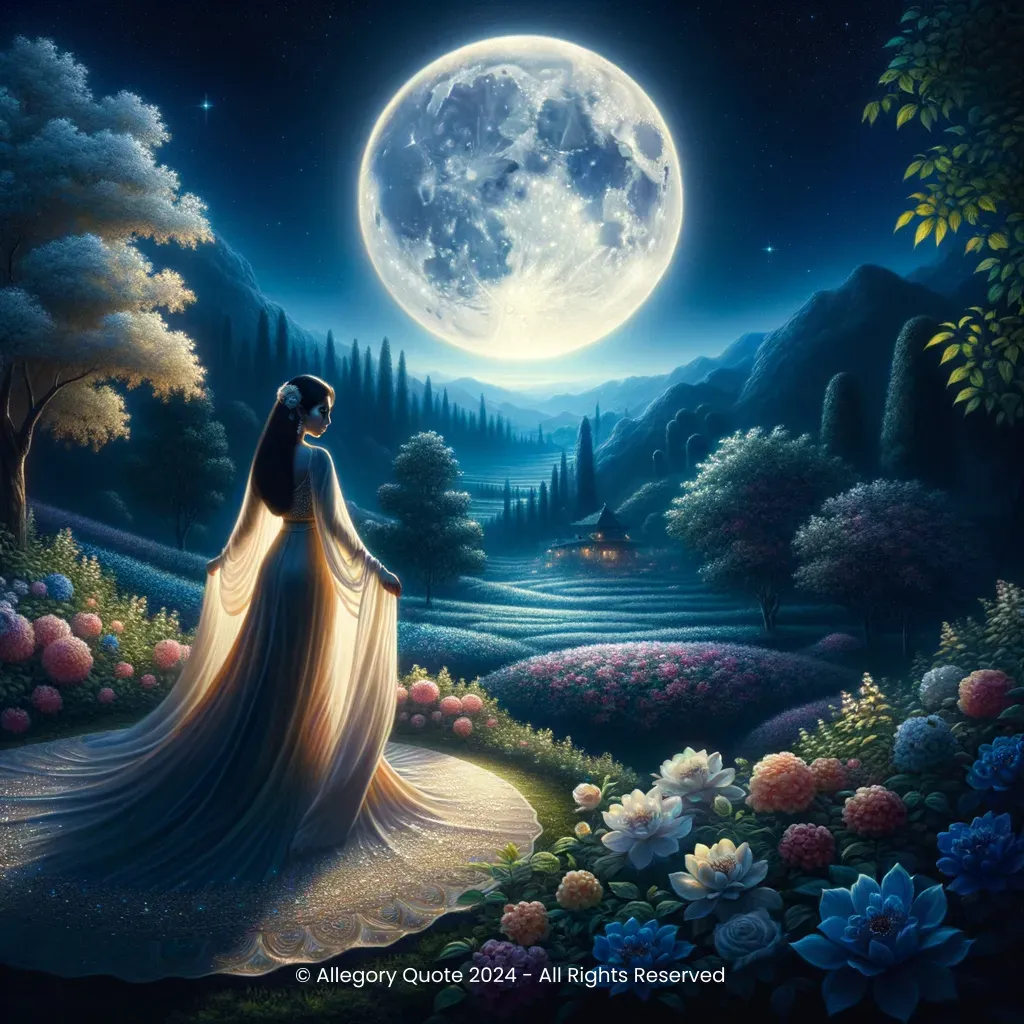She walks in beauty, like the night

0
0
0
0
- Meaning
- The meaning of the phrase "She walks in beauty, like the night" draws a comparison between a woman's beauty and the serene, majestic quality of the night. Unlike typical comparisons to the bright and cheerful day, Byron equates beauty with the calm, serene, and mysterious aspects of the night. This phrase suggests that her beauty is not just about physical appearance but also encompasses her grace, tranquility, and inner harmony. The imagery of the night brings to mind a sense of calm and depth, evoking the idea that her beauty is profound and evocative rather than superficial.
- Allegory
- The elements included in this allegorical image are carefully chosen to reflect the serene and profound beauty described in the phrase. The full moon symbolizes purity and the illumination of hidden beauty. The woman’s flowing attire and gentle demeanor evoke grace and inner harmony. The blooming nocturnal flowers highlight the unique and often overlooked aspects of beauty that flourish under the cover of night. The tranquil night sky with stars provides a backdrop of mystery and calm, emphasizing the depth and quiet elegance suggested in Byron’s comparison. All these elements together create a harmonious scene that invites reflection on the nature of beauty and the quiet grace that embodies it.
- Applicability
- The teaching from this phrase can be applied to personal life by encouraging individuals to appreciate the unique qualities and inner beauty of people around them. It serves as a reminder that true beauty is often found beyond the surface and can be seen in a person’s demeanor and presence. By valuing inner beauty and grace, one can foster deeper and more meaningful connections with others.
- Impact
- The impact of this phrase on culture and literature has been significant. It has been widely quoted and alluded to in various literary works, songs, and films. The phrase itself is celebrated for its eloquent simplicity and evocative imagery, making it a timeless reference for descriptions of beauty and elegance. It has contributed to the popularization of romanticism and continues to inspire poets and writers.
- Historical Context
- The poem "She Walks in Beauty" was written in 1814. The cultural context of the phrase reflects the Romantic era's emphasis on emotional expression, individualism, and the sublime aspects of nature and beauty. During this period, poets often explored the deeper and more profound elements of human experience, which is evident in Byron's comparison of beauty to the night.
- Criticisms
- There are few criticisms directly related to the phrase itself. However, some criticisms of Byron’s work as a whole point to his personal life and reputation, suggesting that his exploration of beauty and love in his poetry did not always align with his real-life actions and behavior. Critics have debated the idealization of beauty and whether it leads to unrealistic expectations.
- Variations
- Variations and interpretations of the phrase are relatively few, as it is often quoted verbatim due to its widespread recognition. However, some cultures interpret beauty in different ways. For instance, while Western culture often emphasizes physical appearance, Eastern philosophies might focus more on inner peace and harmony. The phrase can be appreciated universally as it transcends cultural boundaries to celebrate a serene and profound sense of beauty.
-

A foolish consistency is the hobgoblin of little minds.
-

When one tugs at a single thing in nature, he finds it attached to the rest of the world.
-

Wrinkles should merely indicate where smiles have been.
-

Beauty is in the eye of the beholder.
-

Gratitude is not only the greatest of virtues, but the parent of all others.
-

Not all those who wander are lost.
-

Let God's will be done; He knows what is best for us.
-

Because I could not stop for Death, He kindly stopped for me; The carriage held but just ourselves And Immortality.
-

As You Like It.
No Comments